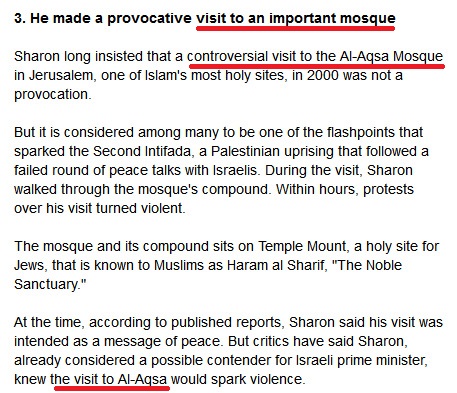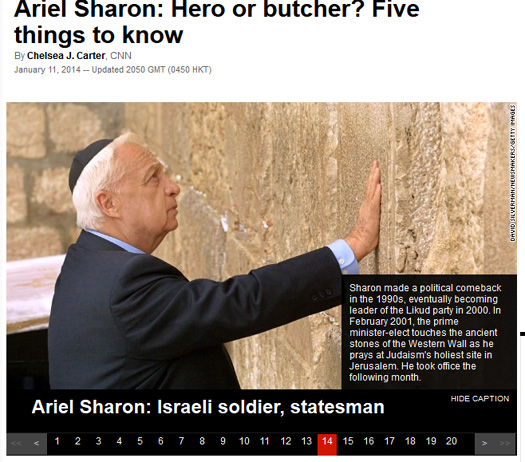Here’s what you should know about CNN’s “Things to Know” features related to Israel: They get stuff wrong. Errors abounded in the Sept. 12, 2013 article “10 things to know before visiting Israel, the West Bank and Gaza,” some of which were eventually fixed following communication from CAMERA.
Chelsea J. Carter’s Jan. 11, 2014 CNN piece “Ariel Sharon: Hero or butcher? Five Things to Know” also gets a thing or two, or five, wrong. So, below we present CAMERA’s “Five Things CNN Needs to Fix in ‘Five Things to Know’ on Ariel Sharon.”
1) Sharon Didn’t Visit the Mosque
Carter, like her colleague at rival network Fox, errs about Ariel Sharon’s September 2000 visit to the Temple Mount, writing: “Sharon long insisted that a controversial visit to the Al-Aqsa Mosque in Jerusalem, one of Islam’s most holy sites, in 2000 was not a provocation.” In addition, Carter later on refers again to “the visit to Al-Aqsa,” and a subheading on the section highlights the error: “He made a provocative visit to an important mosque.”

Sharon never visited the Al Aqsa mosque; He visited the Temple Mount, Judaism’s holiest site, and the third most sacred site in Islam. The Al Aqsa Mosque is located on the Temple Mount plaza, but Sharon did not enter the mosque, and did not visit it. This is a factual error which should be corrected.
Carter is further misleading by noting that the Al Aqsa Mosque “is one of Islam’s most holy sites,” but more vaguely indicating that the Temple Mount is “a holy site for Jews.” In fact, as stated above, the Temple Mount, the site of the first and second Jewish temples, which housed the Holy of Holies, is Judaism’s most sacred site. If she is going to note that the compound is “one of Islam’s most holy sites,” shouldn’t she note that it is Judaism’s most holy site?
Carter’s tendentious reporting on the Temple Mount is again apparent when she writes that the “Temple Mount, a holy site for Jews, that is known to Muslims as Haram al Sharif, ‘The Noble Sanctuary.'” If she includes the Arabic name used by Muslims, Haram al Sharif, why does she omit the Hebrew name used by Jews, Har Habayit?
2) In ’67 War, Jordan, Syria Attacked First
In a separate error which requires correction, the article is wrong on the chronology of the 1967 Six Day War:
Sharon, whose rose through the ranks of the Israeli Defense Forces, first gained hero status among Israelis during the 1967 Six Day War that saw Israel attack Egypt, Jordan and Syria to counter what they saw as an impending attack by the Arab nations.
Israel preemptively attacked Egypt, but Jordan and Syria attacked Israel, and then Israel responded by hitting back. As King Hussein (the late) wrote in his book about the 1967 war, Israel sent him a message saying the Jewish state would not attack Jordan if he didn’t intervene. He described his response:
The Norwegian General informed me that the Israeli Prime Minister had addressed an appeal to Jordan. Mr. Eshkol had summarily announced that the Israeli offensive had started that morning, Monday June 5, with operations directed against the United Arab Republic, and then he added: “If you don’t intervene, you will suffer no consequences.”By that time we were already fighting in Jerusalem and our planes had just taken off to bomb Israeli airbases. So I answered Odd Bull:
“They started the battle. Well they are receiving our reply by air.”
Three times our Hawker Hunters attacked the bases at Natanya in Israel without a loss. And our pilots reported that they destroyed four enemy planes on the ground, the only ones they had seen.
On their side, the Iraqis bombed the airport at Lydda. And a little later, the Syrians finally headed for the base at Ramad David and the refineries in Haifa. (Hussein of Jordan: My ‘War’ with Israel, p. 64-65)
As for the Syrian front, during the first day of the war, on June 5, Syrian planes attacked communities in the north of Israel, including Tiberias, and attempted to attack the Haifa oil refineries. The Israeli air force responded later that day with an attack on Syria’s airbases, destroying 59 Syrian aircraft, mostly on the ground. Michael Oren provides an excellent, detailed account of these events in his book Six Days of War.
Thus, it is a factual error to say that Israel attacked Jordan and Syria “to counter what they saw as an impending attack by the Arab nations.” By the time Israel attacked Jordan and Syria, those two countries had already launched their attacks on Israel. There was nothing “impending” about Jordan’s attack in Jerusalem, and bombing of Israeli bases, nor Syria’s a
ttack on northern Israel.
ttack on northern Israel.
3) Judaism’s Holiest Site
There are also factual errors in the captions to the photographs accompanying the article. The 14th slide misidentifies the Western Wall as Judaism’s most sacred site, stating: “In February 2001, the prime minister-elect touches the ancient stones of the Western Wall as he prays at Judaism’s holiest site in Jerusalem.” As noted above, the Temple Mount is Judaism’s most sacred site. The Western Wall’s holiness derives from its proximity to the Temple Mount. (The Washington Post, Los Angeles Times and BBC are among the media outlets in the past which have published corrections noting that the Temple Mount is Judaism’s holiest site.)

4) Palestinian Rule in Gaza, For the First Time
The caption on the 17th slide trips up on the history of the Gaza, Strip stating: “Sharon pushed for Israel’s historic 2005 withdrawal from 25 settlements in the West Bank and Gaza, which was turned over to Palestinian rule for the first time in 38 years.” The Gaza Strip was not turned over to Palestinian rule for the first time in 38 years. It was turned over to Palestinian rule for the first time ever in history. In 1967, prior to the Six Day War, the Gaza Strip had been under Egyptian rule. The coastal territory was never under Palestinian rule prior to Sharon’s 2005 withdrawal. (BBC corrected a similar error back in 2005).

5) Sharon’s Nickname Was ‘Arik’
Carter writes that Sharon “earned the nickname ‘The Lion of God’ among Israelis for surrounding Egypt’s Third Army…” While a number of Western reporters, perhaps relying on Wikipedia, have recently reported that his nickname is “The Lion of God,” we have yet to find any substantiation for the claim. Sharon’s well-known nickname was “Arik.” Following the 1973 war, he became known as “Arik, King of Israel.” The name Ariel could and has been interpreted as meaning lion of God, though it is more commonly associated with Jerusalem.
CAMERA has contacted CNN concerning these points. Stay tuned for news of corrections.
This report was amended on Jan. 15 to clarify the etymology of the name Ariel.
